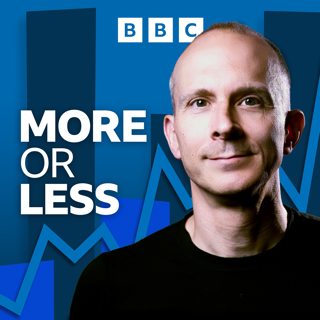
Radio 4: Royal Twins & Autumn Statement
In light of the Royal pregnancy Tim Harford asks what severe morning sickness tells us about the chances of having twins. Yan Wong helps him look at the figures. We disentangle the Chancellor' Autumn Statement and ask: where is the economy really at? As Nigeria prepares to revise its GDP statistics with an expected jump of 40-60%, we ask how reliable are African GDP statistics? Another Daily Telegraph headline comes under scrutiny. And we return to our Lego tower and look at how Lego can be used to teach maths with Eugenia Cheng of Sheffiled University.
7 Dec 201227min

More or Less: How reliable is Kevin Pietersen?
Kevin Pietersen has been widely praised as one of the best England batsmen of the current era and possibly of all time. But in the first test match he only scored 19. So can England really not do without him? Also why is Zero an even number?
3 Dec 20129min

More or Less: Opinion polling, Kevin Pietersen, and stacking Lego
On More or Less this week Tim Harford looks at three polls carried out to gauge the public’s opinion on press regulation gave vastly different answers despite being carried out by the same polling company. Tim talks to Peter Kellner, President of online polling company YouGov. Would you send Kevin Pietersen out to bat if your life depended on him scoring a century? Have two thirds of millionaires really left the country as claimed by the Daily Telegraph this week? What percentage of drinks might be affected by the introduction of a minimum price for alcohol. And how high could you build a Lego tower before the bottom brick collapses? Ruth Alexander dons her safety goggles to find out?
30 Nov 201224min

Fergie Time
This is the first in the new series of the programme. There’s a well-established idea that Manchester United get more added time than every other Premier League team. More or Less looks at the numbers behind this so called ‘Fergie Time’. Do Manchester United get more injury time than other top teams when they’re drawing or losing?
26 Nov 20129min

Ash Die Back and Fergie Time
This is the first in the new series of the programme. Tim Harford has been busy felling some ash tree statistics. He asks whether the UK could lose 30% of our woodland trees and did the ash die back disease really kill 90% of ash trees in Denmark? Plus, there’s a well established idea that Manchester United get more added time than every other Premier League team. More or Less looks at the numbers behind this so called ‘Fergie Time’. Do Manchester United get more injury time than other top teams when they’re drawing or losing?
23 Nov 201227min

Brain Food and Bacteria
There's not an obvious link between chocolate and Nobel prizes, but this did not stop news outlets around the world reporting the amount of chocolate a country consumes influences the number of Nobel prizes they will win. In many cases the scientific study was reported without question or comment. Ruth Alexander asks what this story tells us about the way the media reports scientific studies, and why the correlation between the two might be so strong. Also – it's often said that chopping boards or dishcloths have many more bacteria than toilet seat but is this really true?
19 Nov 20129min

Voodoo polling? Predicting the US election
This week Ruth Alexander looks at the other winner the US elections. Blogger and pioneer of aggregated polling, Nate Silver, predicted the outcome of the vote in every state one better than 2008. Others who have tried similar methods have also done well. Is this the dawn of a new era of poll prediction or just luck? Also, what effect did Hurricane Sandy have on death rates in places it hit and how did they differ from a normal day.
12 Nov 20129min

Is America’s conviction rate really 99.5%?
Conrad Black has claimed that 99.5% of prosecution cases in America end up in convictions. Is it really this high? We try to estimate how this compares to the number of convictions in other parts of the world.
5 Nov 20129min





















